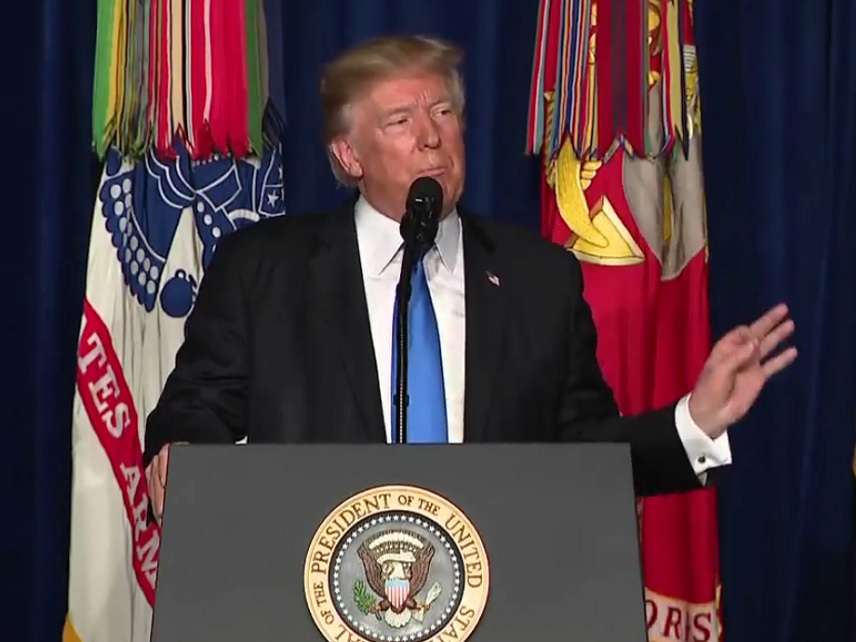Trump Opens Door For Afghanistan Peace, But Says U.S. Sticking Around
Says he's going against his first instinct, but that that's what presidents do.

The war in Afghanistan will continue until further notice, President Donald Trump made clear Monday night, but he left the door open for a negotiated solution to the conflict.
"Someday, after an effective military effort, perhaps it will be possible to have a political settlement that includes elements of the Taliban and Afghanistan," President Trump said in a nationally-televised address in Fort Myer, Va., "but nobody knows if or when that will ever happen."
Trump tried to articulate the why of the Afghanistan war, which boiled down to: "We are not nation building again. We are killing terrorists."
"We will not talk about numbers of troops or our plans for further military activities," he said. "Conditions on the ground, not arbitrary timetables, will guide our strategy from now on. America's enemies must never know our plans or believe they can wait us out. I will not say when we are going to attack, but attack we will."
Secretary of State Rex Tillerson buttressed what is a reversal in a long-held position by Trump with a statement after the president's address committing to oppose the Taliban in the country.
"We are making clear to the Taliban that they will not win on the battlefield," Tillerson said. "The Taliban has a path to peace and political legitimacy through a negotiated political settlement to end the war."
"We stand ready to support peace talks between the Afghan government and the Taliban without preconditions," Tillerson continued. "We look to the international community, particularly Afghanistan's neighbors, to join us in supporting an Afghan peace process."
Trump admitted his decision to continue the U.S. war in Afghanistan went against his prior judgment on the issue.
"My original instinct was to pull out, and historically I like following my instincts," Trump said. "But all my life, I have heard that decisions are much different when you sit behind the desk in the Oval Office… So I studied Afghanistan in great detail and from every conceivable angle."
It wasn't just an instinct—Trump spent years calling the war in Afghanistan a costly mistake.
Trump laid out a five-pillared "strategy," including "conditions-based" decision-making and a blackout on troop levels and activities, as well as a potential political solution, or "the integration of all instruments of American power, diplomatic, economic, and military, toward a succesful outcome."
Trump threated to cut off military aid to Pakistan and take other measures if it didn't end its support for terror groups operating in Afghanistan. Trump also called on India to help with economic assistance and development there.
Trump stressed ending "micromanagement from Washington, D.C.," and loosening the rules of engagement in an unspecified way. Trump has been a fan of torture, but also said he was deferring to Defense Secretary James Mattis, who opposed torture, on lifting that particular ban.
In his address tonight, Trump did not offer to go to Congress to seek a new authorization of the use of military force (AUMF) neither for Afghanistan nor for the broader battle against ISIS (which also operates in Afghanistan).
The 2001 AUMF has been used by three consecutive administrations to justify military operations across the Muslim world, from Nigeria to the Philippines, even in Libya, after a U.S.-backed intervention toppled the Qaddafi regime and opened the country to terror groups like ISIS.
Fitting the war on terror where, how, and wherefore it's being fought in 2017 into the 2001 AUMF is an impossible task. Successive administrations have gotten away with using it as blanket cover for counterterrorism operations around the world largely because of Congress' unwillingness or inability to assert its constitutional role and de-authorize or de-fund such excursions.
Even the lightest interrogation of the post-9/11 AUMF and its relationship to the present wars reveals how disconnected the military authorization is from current military activities. The terrorist safe havens Trump says have emerged in recent years in Afghanistan are not related to September 11 but to the U.S. war launched in response, just as the emergence of ISIS is related not to September 11 but to the U.S. war in Iraq.
The U.S. war on terror has suffered from serious mission creep and an aggressive lack of direction, with the U.S. meandering from one conflict to the next and back again. Only an open debate in Congress over a new AUMF can offer any hope to untangle these problems.
